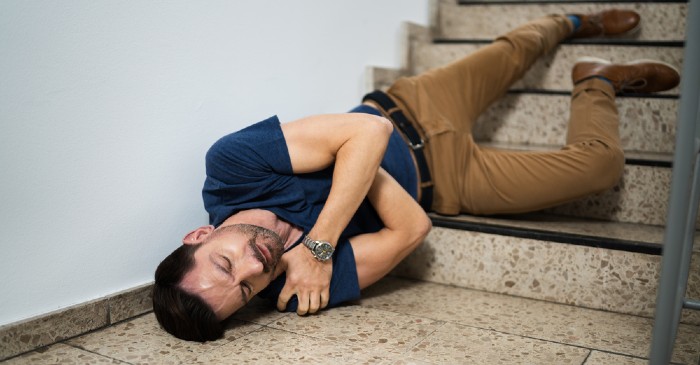
Do you know the difference between slips, trips, and falls? A slip is when you lose your footing, a trip is when you catch your foot on or in something, and a fall is when you come down suddenly, often hitting the ground or another object with a great deal of force. Learn the difference to know which kind of personal injury claim to file.
Slips, trips, and falls happen for many reasons. Weather, such as ice, snow, and rain; loose mats or rugs; slippery or uneven surfaces; poor lighting, clutter, and much more can be the culprits. Some are truly accidents while others may be due to negligence on the part of another. Often, these types of accidents are referred to as premises liability.
Did you know:
Prevention strategies should emphasize education, training and creating safer environments to reduce risk.
Keep in mind, the older you are, the more likely you are to break a bone as a result of a slip, trip, or fall.
Common injuries include:
Traumatic brain injuries, or TBIs, are caused by a bump, blow, or jolt to the head that disrupts the normal function of the brain. These injuries can range from mild concussions to more serious injuries such as a skull fracture. Severe injuries can cause seizures and loss of bodily control; however, mild TBIs (concussions) account for about 75% of traumatic brain injuries.
Spinal cord injuries can happen when a slip, trip or fall causes you to hit the ground with your back or when you twist to avoid a fall. Injuries may include slipped discs, hernias, or even paralysis.
Broken hips or a broken pelvis are common injuries for the elderly population, those whose bones are more brittle, but can happen at any age. These fractures typically require a long recovery and can permanently impact your mobility.
Shoulder and/or neck injuries happen when you fall and land on this part of the body or as you twist to prevent a fall. Neck injuries can range from muscle sprains to spinal injuries; shoulder injuries can include dislocation, torn nerves, and collarbone breaks.
Limb fractures (arms and legs) are caused when the force of the impact of your fall breaks one of these bones. Again, the elderly population tends to suffer these fractures due to the brittleness of their bones. These injuries can mean surgery, long recovery times, and casts that can limit mobility. Wrist and ankle fractures or sprains/strains are some of the most common types.
Torn ligaments, tendons, and muscles happen when you overexert yourself or twist to stop yourself from falling. Often surgery and physical therapy are needed and, depending on the severity, you may not regain full mobility.
Twisting as you fall can damage the MCL or ACL in the knee or you could potentially dislocate your patella.
Have questions? Contact us at (877) 284-6600.
After any slip, trip, and fall accident, the best course of action is to get checked out by a doctor or go to the emergency room.
 Have you been seriously injured in a slip, trip or fall accident? Call Nash & Franciskato at (877) 284-6600. We have a successful track record for helping accident victims collect the compensation they deserve.
Have you been seriously injured in a slip, trip or fall accident? Call Nash & Franciskato at (877) 284-6600. We have a successful track record for helping accident victims collect the compensation they deserve.
In the Kansas City area and across Missouri, the Nash & Franciskato Law Firm will fight for your rights. Contact our legal team today at (877) 284-6600. One of our experienced staff will speak with you personally and will provide you with a free, no-obligation case evaluation.
SCHEDULE YOUR FREE CASE EVALUATION
If you would like to receive news and blog updates on a regular basis, sign up to receive our email newsletter. Your email address will only be used to send you our newsletter and respond to inquiries.
Past results afford no guarantee of future results and each case is different and is judged on its own merits. The choice of a lawyer is an important decision and should not be based solely upon advertisements.
Editor’s Note: This post was originally published January 7, 2021. It was reviewed on September 14, 2022 and again on June 14, 2024 for content and accuracy